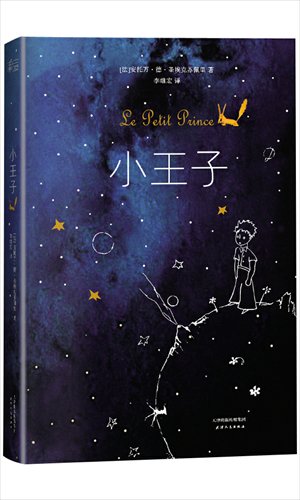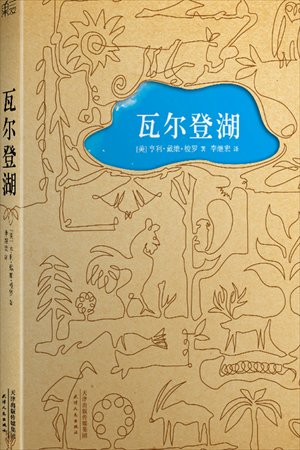HOME >> ARTS
As simple as A to B
By Liao Danlin Source:Global Times Published: 2014-4-17 22:18:01

Chinese translations of Le Petit Prince Photo: Courtesy of Li Jihong

Chinese translations of Walden Photo: Courtesy of Li Jihong
Fu Weici (1923-2014), a respected master who is famous for his translation of Thomas Mann's Buddenbrooks, Graham Greene's The Heart of the Matter and William Somerset Maugham's The Moon and Sixpence passed away last month. With his passing, many in the media have lamented that with so many master translators from the last century gone, we are now entering an era lacking expert translators.However, with the rise of powerful search engines and an increasing number of people able to speak a foreign language, a new generation of translators are gaining increasing attention.
The 33-year-old Li Jihong is one of them.With his translations being called "the most brilliant translation so far" or "the Best Chinese translation of Walden in 159 years," this young translator has had a huge impact on the modern translation industry.
Speedy delivery
"Translated works, be it fiction or non-fiction, just didn't become best-sellers here several years ago. My translations are the exception to the rule," Li told the Global Times in an e-mail interview.
Li isn't just tooting his own horn. Since he translated The Kite Runner in 2006, the book has continued to stay on best-seller lists for the past eight years, selling over 3 million copies so far.
"This is a miracle if you compare it to the average sale of (translated) books in China, which is no more than 5,000 copies," said Li.
Having cooperated with Li for many years, Qu Hongbin, CEO of publisher Guomai, has stated on many occasions that several of Li's translations including Conversations with God, Le Petit Prince, The Great Gatsby and The Old Man and the Sea continue to be No.1 in sales compared to other Chinese translations of these very same books.
Li has had a very high profile in recent years. Marketed as a "genius translator," Li has made a number of public statements about translation that have drawn attention as well as controversy.
For example, he has stated that his average translation speed is 1,000 to 1,500 words per hour. As such, by working long hours every day, he managed to translate The Kite Runner (195,190 words) in only 10 days.
The statement quickly drew criticism because in the past, famous old translation masters like Fu Lei (1908-66) would tell stories about how they would only translate 800 words every day, spending the rest of the day reviewing every detail of their work.
"A qualified and experienced literary translator should render about 500 English words, equivalent to 1,000 Chinese characters, per hour if he or she is doing popular fiction like Harry Potter or The Fault in Our Stars. I managed to finish about 10 books at that rate," Li told the Global Times, adding that for academic projects like The Fall of Public Man, or a literary classic, it would be a different story.
Li also has a public site on douban.com - a ratings site for books, films and music - where he constantly asks readers to point out any mistakes that they may have found in his books. Early this year, he also held an online event stating that any readers unsatisfied with his newly translated version of Walden could get a refund of double their money back.
Changing times
Gu Fangji's translation of La Peste by Albert Camus, published by the Shanghai Translation Publishing House in the early 1980s, became a role model that inspired many writers at the time. Looking back now, that and the achievements of other famous translators of the last century seem almost legendary.
He Yujia, the 30-year-old translator of the novel House of Cards, told the Global Times that Wang Zuoliang's (1916-95) translation of the book Of Study was what inspired her to become a translator.
"I didn't know it was written by Francis Bacon until I started to learn English in middle school. I thought the writer was some Qing Dynasty (1644-1911) literary master," He said.
He finds that a difference in ability between the popular translators of the last century and the younger ones of this century does exist.
She admitted that while some of the vocabulary used in older translations is out-of-date now, the way those translators phrased things in Chinese is much better than what the current generation of translators who grew up with the Internet and bilingual education are capable of.
Xu Jun, a translator and professor at Nanjing University, said in an interview with the Southern Metropolitan Daily that to understand the current state of translation, we need look at things from a historic point-of-view.
"In the 1920s and 1930s, for example, translated books carried more social responsibility than just their role as literature. They also played the role of passing on political views and ideologies," said Xu, who feels translated works have returned to their role as mere literature, which is why translators are no longer as respected as in the past.
Another problem caused by this change is that translation has become a somewhat underestimated field with average salaries ranging from 50 - 100 yuan ($7 - 15) per 1,000 characters, leaving less people who focus specifically on translation as a profession.
Xu also pointed out that back when those old translation masters were young, the editors of the time also possessed an incredible amount of knowledge and so were qualified to make appropriate changes to a translator's work. "Finished translations, including ones by Fu Lei, were all edited by the People's Literature Publishing House. There are few editors now with the ability to do the same."
Ren Zhan, who has translated many of Stephen King's books, told the Global Times that she and another translator were once invited to London for a two-month closed-door translation of J.K. Rowling's The Casual Vacancy in order for the book to be published as soon as possible after the original version was released.
Similar to Ren's experience, many publishers nowadays aim to reduce the gap in time between the publication of the original book and its foreign editions, thereby taking translation work even farther from the painstaking and slow process it used to be in the past.
No longer invisible
While He maintains the traditional view that the individual writing style of a translator should be "invisible" to readers, as a translation is meant to reflect the style of the original author, Li insists that a translated work is more of a cooperation between a writer and a translator, and that the finished translation has its own destiny apart from the original.
Opinions such as Li's have many questioning the quality of many of the translations out there today.
"My feeling is that overall translated works have improved, but since the number of translations has increased, the number of low-quality translations has also risen," said Xu.
Posted in: Books